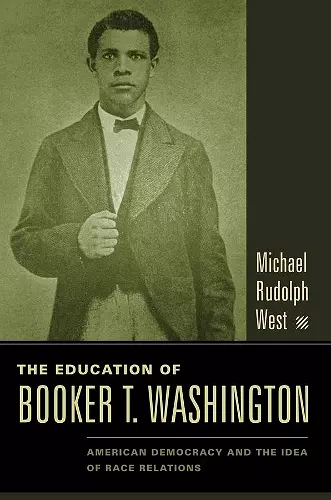The Education of Booker T. Washington
American Democracy and the Idea of Race Relations
Format:Paperback
Publisher:Columbia University Press
Published:25th Nov '08
Currently unavailable, and unfortunately no date known when it will be back

In this major reconsideration of Booker T. Washington's life and thought, Michael Rudolph West explores why Washington's ideas resonated so strongly in the post-Reconstruction era and considers their often negative influence on the ongoing struggle for equality in the United States. According to West, Washington's "race relations" offered a "solution" to the problem of racial oppression in a nation professing its belief in democracy. In practice, though, his theories lent support to the supposition that African Americans could prosper under Jim Crow without the normal levers by which other Americans pursued their interests. West contends that Washington did not seek to end the segregationist policies of southern states. Instead, he offered an ideology that would obscure the injustices of segregation and preserve some measure of racial peace. By embracing Washington's views, white Americans could then resolve the contradictions raised by segregation in a supposedly democratic society. This was (and is) Washington's legacy: a form of racial analysis, at once obvious and concealed, that continues to prohibit the realization of a truly democratic politics.
Booker T. Washington has long held an ambiguous position in the pantheon of black leadership. Lauded by some in his own lifetime as a black George Washington, he was also derided by others as a Benedict Arnold. In The Education of Booker T. Washington, Michael West offers a major reinterpretation of one of the most complex and controversial figures in American history. West reveals the personal and political dimensions of Washington's journey "up from slavery." He explains why Washington's ideas resonated so strongly in the post-Reconstruction era and considers their often negative influence in the continuing struggle for equality in the United States. West's work also establishes a groundwork for understanding the ideological origins of the civil rights movement and discusses Washington's views on the fate of race and nation in light of those of Thomas Jefferson, Frederick Douglass, Martin Luther King Jr., and others. West argues that Washington's analysis was seen as offering a "solution" to the problem of racial oppression in a nation professing its belief in democracy. That solution was the idea of "race relations." In practice, this theory buttressed segregation by supposing that African Americans could prosper within Jim Crow's walls and without the normal levers by which other Americans pursued their interests. Washington did not, West contends, imagine a way to perfect democracy and an end to the segregationist policies of southern states. Instead, he offered an ideology that would obscure the injustices of segregation and preserve some measure of racial peace. White Americans, by embracing Washington's views, could comfortably find a way out of the moral and political contradictions raised by the existence of segregation in a supposedly democratic society. This was (and is) Washington's legacy: a form of analysis, at once obvious and concealed, that continues to prohibit the realization of a truly democratic politics.
West's arguments...are fascinating and compel us to rethink our views of this complex and contradictory man. The Historian Illuminating... West's study stands out for its innovative argument as well as the author's deep personal investment. Publishers Weekly The author offers interesting assessments of other commentators on race... Significant ideas. Kirkus West's reflections offer fresh considerations on the complex consequences of American racism. Library Journal Recommended. Choice One of the most important books on Washington and on black thought in recent years. -- W. Fitzhugh Brundage The Journal of American History This is a book that must be read. -- Gregory Mixon American Historical Review An important work. -- Mia Roth The European Legacy
ISBN: 9780231130493
Dimensions: unknown
Weight: unknown
296 pages